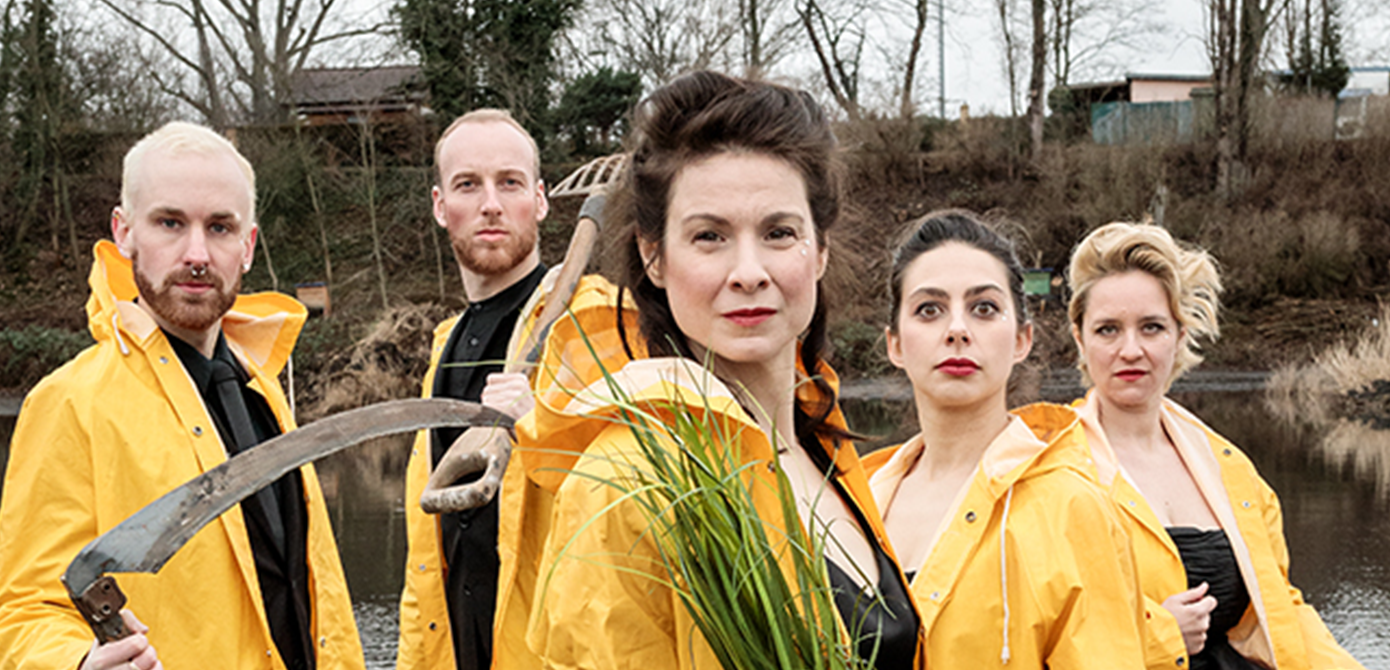Olivia Stahn studied singing in Lübeck and Berlin. Engagements have taken her to the Hanover State Opera, the Stuttgart State Theater, the Dresden Music Festival, the Berlin Konzerthaus, the Leipzig Bach Festival and the Schwetzingen Festival, among others. She sings regularly at the Staatsoper Unter den Linden in Berlin and has appeared several times at the Lucerne Festival under Pierre Boulez. Recordings have been made for Wergo, cpo and the Berlin label Corinne De Berne. She is co-founder of THE PRESENT and holds the artistic direction of the ensemble together with Hanna Herfurtner and Amélie Saadia.
How did the project THE PRESENT SAVES THE WORLD begin and how did it develop?
O.S.: Mainly Hanna, Amélie and I conceive the projects for THE PRESENT. We have been working on the topic of climate – climate crisis for quite some time. Then we applied for the reload grant from the German Federal Cultural Foundation and were granted it. First, together with the director and author Therese Schmidt, who is also part of the project now, we read a lot of books on climate and the climate crisis, did research and talked to scientists (you can listen to these conversations as a podcast/editor’s note). The Neuköllner Oper was interested in the project, and so it became concrete.
Can you please say something about the content of the project and the individual parts?
O.S.: The three parts of the evening already belong together – it is a three-part program, so to speak, but they can also be attended individually. The title of the first part CRY MY A RIVER refers to the pop song by Justin Timberlake, the second part to the title WORK, BITCH by Britney Spears. Both titles are also musically processed in the respective evenings.
CRY ME A RIVER is about failure. If we as humans want to deal with climate change and meet this challenge, there has to be transformation, inner rethinking. We need a shift in values and new perspectives of living together. The structure individualism-freedom has to be seen in a new way. For this we need a different view. To start this process, we have to let go: grieve for what we can no longer have as it is. Grieve also for what we humans have screwed up. A musical flood of tears symbolizes this psychological process. All the lyrics of the musical pieces are about tears.
WORK, BITCH is about the process of change. It is a “training.” To change, one must “practice”, repeat new attitudes and habits. The music used is also changed. We work here with amplification and electronics.
FOUNTAIN OF JOY stands for the hope that we can achieve something. The singers step back even further in this part as a classical vocal ensemble. It is about listening to what is already there in nature in terms of sound – as a metaphor for “there is already quite a lot, we can rely on the abundance”. The natural cycles and their contradiction to the growth constraints of the economic system are to be made perceptible to the senses.
How is the music for your projects created? Is there someone in your team who “wears the hat” for this project?
O.S.: We use music from all centuries of music history: medieval music, music of the late Renaissance, new music (e.g. by Lucia Ronchetti and Alvin Lucier), pop songs and sometimes a hit song by Helene Fischer or references to the music of John Cage. The arrangements tailored for our ensemble are made by Amélie, and for two other projects Tim Karweick, our other tenor, is now also involved in this field. THE PRESENT RETTET DIE WELT also features instruments played by the singers.
Where will the three parts of THE PRESENT SAVES THE WORLD be performed?
O.S.: CRY ME A RIVER will be performed in the Kiezkapelle at the New St. Jacobi Cemetery. The reference to the theme of “tears” suggests that. WORK, BITCH will take place on the Floating Berlin site, formerly Floating University Berlin. This is the rainwater retention basin of the former Tempelhof Airport at Columbiadamm. The site has a certain work-activism character and fits the theme of this part. And for FOUNTAIN OF JOY, we take the audience to Spreepark, the old amusement park site in Plänterwald. The remains of the MERO hall will be our venue. The overgrown terrain and nature give us the perfect backdrop for this evening.
How did the ensemble THE PRESENT come into being?
O.S.: Amélie, Hanna and I have known each other for a very long time. In 2017, we did a project together for the Schwetzingen Festival. The idea for the evening THE TRUTH AND LIFE, which intertwined Luciano Berio’s A-Ronne and motets by J. S. Bach (performed at the Schwetzingen Festival in 2019), then brought us together as an ensemble in its current form.
What is most important to you artistically as THE PRESENT vocal ensemble and to you personally as Olivia Stahn?
O.S.: As an ensemble, we want to put new and early music into a different context than is usually done in concerts. In an abstract and concrete sense, we also want to invite the audience sensually and take them along to experience contrasts.
For myself, it is important to use the music to convey content that goes beyond pure music. To be honest, I have little desire for concerts according to a pattern. You have to be interested in the music itself in order to get out of traditional structures. In doing so, one must not care too much about existing boundaries.
The interview was conducted by Magdalena Weidauer. The text appeared in print form in March 2022 in NoWumm, the members’ newspaper of Neuköllner Oper e. V.
